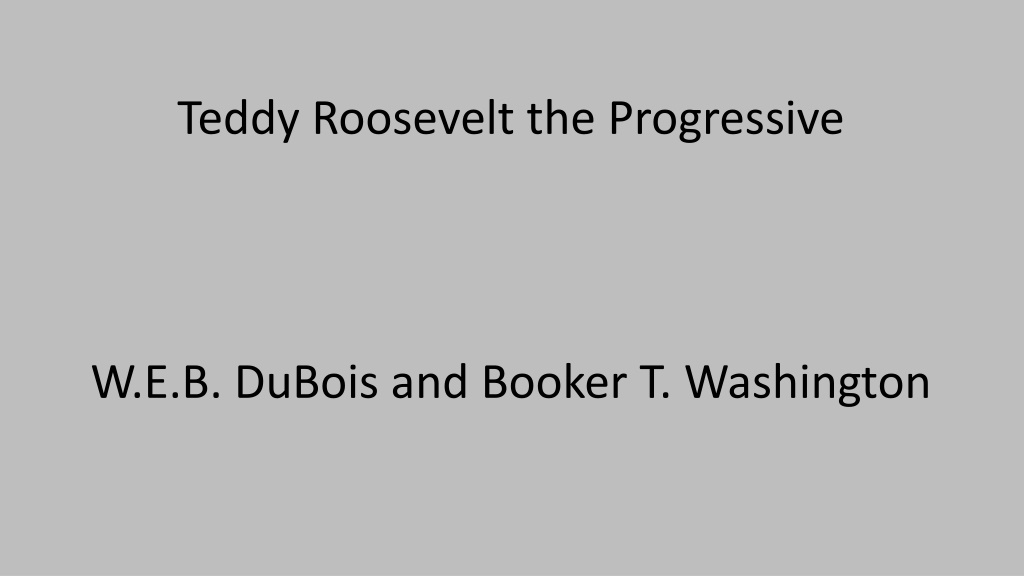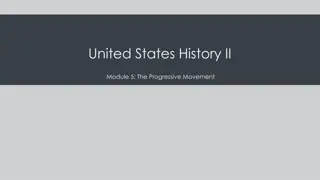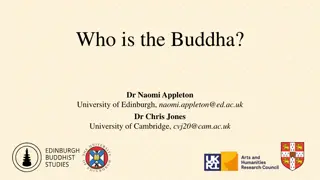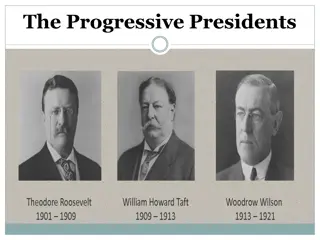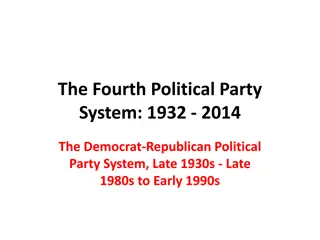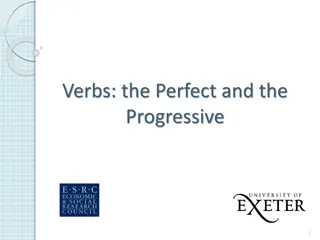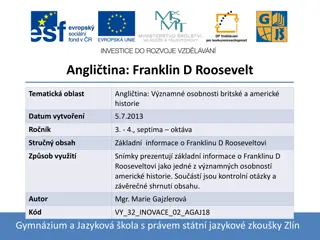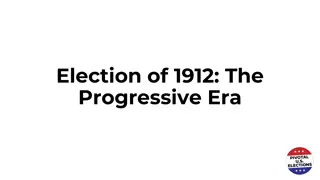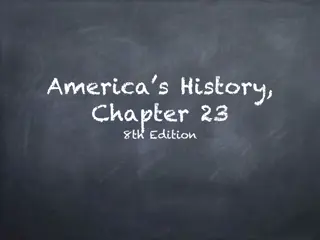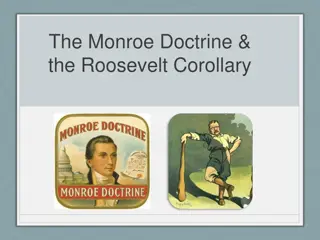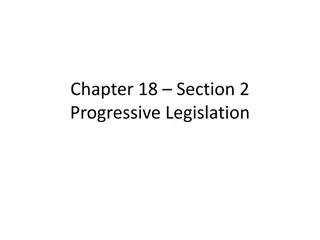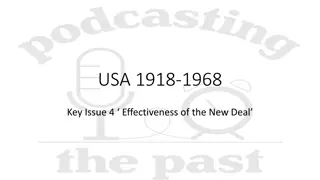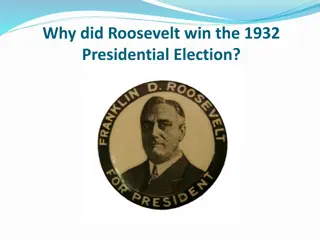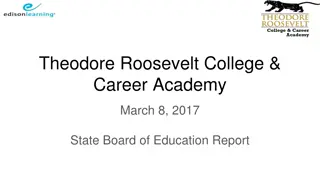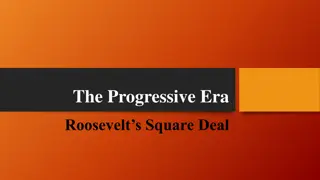Teddy Roosevelt: The Progressive Reformer
Teddy Roosevelt, a renowned Progressive leader, implemented significant reforms during his presidency. From breaking up monopolies to advocating for women's suffrage and workers' rights, Roosevelt's legacy as a reformer reshaped American politics.
Download Presentation

Please find below an Image/Link to download the presentation.
The content on the website is provided AS IS for your information and personal use only. It may not be sold, licensed, or shared on other websites without obtaining consent from the author.If you encounter any issues during the download, it is possible that the publisher has removed the file from their server.
You are allowed to download the files provided on this website for personal or commercial use, subject to the condition that they are used lawfully. All files are the property of their respective owners.
The content on the website is provided AS IS for your information and personal use only. It may not be sold, licensed, or shared on other websites without obtaining consent from the author.
E N D
Presentation Transcript
Teddy Roosevelt the Progressive W.E.B. DuBois and Booker T. Washington
Teddy Roosevelt: The Progressive After the assassination of William McKinley, his VP Teddy Roosevelt becomes President in 1901. Be super familiar with Roosevelt as a Progressive, as a Conservationists, and as an Imperialist As Governor of NY in 1898, he was certainly familiar with How the Other Half Lives , and toured Tenements with Riis. He supported city and statewide progressive reforms like housing and factory conditions As President, he will certainly help push through some national reforms, but he will be a friend of business in certain areas
Teddy Roosevelt: The Progressive Attempted to appoint people who would better enforce the Sherman Anti-Trust Act (1890) and the Interstate Commerce Act. Famously T.R. breaks up the Northern Securities Company (owned by JP Morgan) Created the Bureau of Corporations tasked with assisting the Justice Department in investigating business practices Got the Hepburn Act (1906) passed through Congress. This law allowed the federal government to set shipping rates on railroads, and ended the practice of discriminatory shipping deals. Major piece of legislation. Know it.
Teddy Roosevelt: The Progressive Roosevelt serves his terms as President, and retires temporarily from politics After some adventuring through Africa and South America, he re-enters politics not as a Republican, but under his own new Progressive banner He decides he wanted to run for President again in 1912 and delivers his famous New Nationalism Speech where he argued the private property needed to be controlled to whatever degree the public welfare may require it
Teddy Roosevelt: The Progressive Roosevelt supports Women s Suffrage, a national minimum wage for women, and a national child labor law He and his supporters split from the Republican Party and Roosevelt s hand picked successor Taft, and became known as the Progressive Party or the Bull Moose Party The Election of 1912 has four major candidates: Teddy Roosevelt (Progressive/Bull Moose Party) Eugene Debs (Socialist Party) William Howard Taft (Republican and current President) Woodrow Wilson (Democrat) All candidates support some level of Progressive Reforms. What does that tell you about the current pulse of many American Voters?
La La Follette Follette and the Wisconsin Idea and the Wisconsin Idea Progressive and Socialist government policies are being experimented with in the early 1900 s. The goal was to apply intelligence, education, and reason to the issues of society in order to come up with a plan that benefitted everyone Robert La Follette the Progressive Gov of Wisconsin advocated for government intervention in the economy and wanted Progressive economic experts to dictate economic policies His policies and reforms became known as the Wisconsin Idea and a number of State reforms are passed under La Follette He fought to give Wisconsin citizens the right to the Recall (process for removing an elected official) and Referendum (process where voters actually vote on specific laws/policies instead of law makers)
Courts and Progressive reform In the era of Progressive reform, the Court (State and Supreme Courts) often tries to undermine the efforts of reforms and support large businesses and property interests Strike down early efforts at a federal income tax In NY, strike down a public health law preventing cigar manufacturing in Tenements Federal Supreme Court: Lochner V. New York (1905) the court tells the state of New York (meaning the law makers in NY) that they cannot limit the hours pf a baker s work day because it violated his right to make a contract. Courts typically use the 14thAmendment and the right to property to justify their anti-progressive rulings
Harvard educated early Civil Rights leader from Massachusetts America s leading African American intellectual in 1900 Founded the NAACP (National Association for the advancement of Colored People) Declared The policy of compromise has failed Major voice against Jim Crow Laws and Lynching W.E.B. DuBois W.E.B. DuBois
W.E.B. DuBois W.E.B. DuBois In 1905 called a major Civil Rights meeting on the Canadian side of the Niagara Falls border. They couldn t find a hotel on the US side to host them Advocated for full voting rights, an end to racial discrimination, equal treatment in the justice system, and equal opportunity in education, jobs, health care, and military service Becomes known as the leader of the Niagara Movement advocating for these changes in society. These changes will not be realized until after the death of Dr. Martin Luther King. DuBois does not want to accept anything less than equality. No compromise. He wants to use legal means to enforce equality. Similar to how it will be done in the 1950 s and 1960 s
Booker T. Washington Booker T. Washington Born into slavery and experienced the Jim Crow South first hand Understood that most Blacks lived in the South and were sharecroppers; he advocated for technical trade schools, not traditional higher educational opportunities Opened Tuskegee Institute in 1881 for African Americans to obtain higher learning
Booker T. Washington Came to prominence in 1895 when he gave his Atlanta Compromise Address He gave a very concessionary speech to a group of white southern politicians in Georgia where he attempted to avoid conflict and appease State leaders In all things that are purely social, we can be as separate as the fingers. Yet as one as the hand in all things essential to mutual progress Booker T. Washington did not want to antagonize whites by advocating for direct civil rights and equality like W.E.B. DuBois. Instead he wanted to avoid conflict, have his people attend industrial vocational/trade schools, and utilize economic opportunities and entrepreneurship to obtain equality
